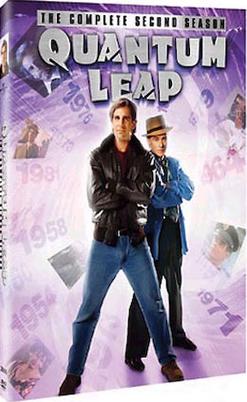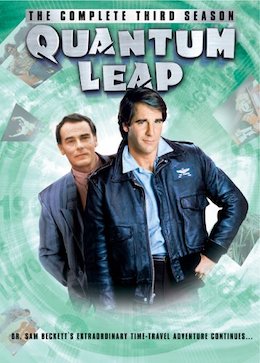Related Research Articles

Quantum Leap is an American science fiction television series, created by Donald P. Bellisario, that aired on NBC for five seasons, from March 26, 1989, to May 5, 1993. The series stars Scott Bakula as Dr. Sam Beckett, a physicist who, believing he has invented a way to travel through time, voluntarily subjects himself to an experiment that he believes will prove the validity of his controversial theories. Sam “leaps” into the fluid of spacetime and apparently disappears forever. However, it is soon revealed that Beckett's consciousness is alive and able to transfer to and inhabit the bodies of other people existing on his timeline. The artificially intelligent computer he created operates with the assumption that in order to return home, Sam must change events in the past in order to "correct" the future course of events, which have somehow been changed in an undesirable way by an unknown agent.

Scott Stewart Bakula is an American actor. He is known for his roles in two science-fiction television series: as Sam Beckett on Quantum Leap – for which he was nominated for four Primetime Emmy Awards and three Golden Globe Awards – and as Captain Jonathan Archer on Star Trek: Enterprise. From 2014 to 2021, he portrayed Special Agent Dwayne Cassius "King" Pride on NCIS: New Orleans.

Harold "Jack" Albertson was an American actor, dancer and singer who also performed in vaudeville. Albertson was a Tony, Oscar, and Emmy winning actor, which ranks him among a rare stature of 24 actors who have been awarded the "Triple Crown of Acting".

The Hustler is a 1959 debut novel by American writer Walter Tevis. It tells the story of a young pool hustler, Edward "Fast Eddie" Felson, who challenges the legendary Minnesota Fats. The novel was well-received by critics, and was adapted into a 1961 film of the same title, starring Paul Newman as Fast Eddie, Jackie Gleason as Minnesota Fats, and Piper Laurie as Sarah. A sequel, The Color of Money, was published in 1984.

The Color of Money is a 1986 American sports drama film directed by Martin Scorsese. It is the sequel to the 1961 film The Hustler. Like the previous film, The Color of Money is based on the 1984 novel by Walter Tevis.

The Holodeck is a fictional device from the television franchise Star Trek which uses "holograms" to create a realistic 3D simulation of a real or imaginary setting, in which participants can freely interact with the environment as well as objects and characters, and sometimes a predefined narrative.
Hustling is the deceptive act of disguising one's skill in a sport or game with the intent of luring someone of probably lesser skill into gambling with the hustler, as a form of both a confidence trick and match fixing. It is most commonly associated with, and originated in pocket billiards (pool), but also can be performed with regard to other sports and gambling activities. Hustlers may also engage in "sharking"—distracting, disheartening, enraging, or even threatening their opponents—to throw them off. Hustlers are thus often called "pool sharks". Professional and semi-pro hustlers sometimes work with a "stakehorse"—a person who provides the money for the hustler to bet with —in exchange for a substantial portion of all winnings. Another form of hustling is challenging "marks" to bet on trick shots that seem nearly impossible but at which the hustler is exceptionally skilled. Chess hustlers are quite common in urban areas in the United States and elsewhere, often offering speed chess against any takers. Unlike most hustlers, chess hustlers are often assumed to be skilled and are seen as a challenge.
Dr. Samuel John Beckett is a fictional character and the protagonist on the 1989-1993 science fiction television series Quantum Leap, played by Scott Bakula.

Deborah M. Pratt is an American director, writer, television producer and actress.

The Primetime Emmy Awards, or Primetime Emmys, are part of the extensive range of Emmy Awards for artistic and technical merit for the American television industry. Bestowed by the Academy of Television Arts & Sciences (ATAS), the Primetime Emmys are presented in recognition of excellence in American primetime television programming. The award categories are divided into three classes: the regular Primetime Emmy Awards, the Primetime Creative Arts Emmy Awards to honor technical and other similar behind-the-scenes achievements, and the Primetime Engineering Emmy Awards for recognizing significant contributions to the engineering and technological aspects of television. First given out in 1949, the award was originally referred to as simply the "Emmy Award" until the International Emmy Award and the Daytime Emmy Award were created in the early 1970s to expand the Emmy to other sectors of the television industry.
Velton Ray Bunch is a film and television composer. Sometimes credited as Ray Bunch. Bunch has been nominated for an Emmy three times for his work, and won the fourth time for his score to the Star Trek: Enterprise episode "Similitude".

The Hustler is a 1961 sports drama film, directed by Robert Rossen. It tells the story of small-time pool hustler "Fast Eddie" Felson, who challenges legendary pool player "Minnesota Fats".

"Good Night, Dear Heart" is a 1990 episode of the American science fiction television series Quantum Leap. Lead character Sam Beckett "leaps" to 1957, into the body of a mortician investigating the death of a young West German immigrant woman. What at first appears to be a suicide by drowning turns out to be foul play. The episode, the 17th of season 2, was written by Paul Brown and directed by Christopher T. Welch. It aired originally on March 7, 1990.

The first season of Quantum Leap ran on NBC from March 26 to May 17, 1989. The series follows the exploits of Dr. Sam Beckett and his Project Quantum Leap (PQL), through which he involuntarily leaps through spacetime, temporarily taking over a host in order to correct historical mistakes. Season one, a late-season replacement, consists of nine episodes.

Season two of Quantum Leap ran on NBC from September 20, 1989 to May 9, 1990. The series follows the exploits of Dr. Sam Beckett and his project Quantum Leap, through which he involuntarily leaps through spacetime, temporarily taking over a host in order to correct historical mistakes. Season two consists of 22 episodes.

Season three of Quantum Leap ran on NBC from September 28, 1990 to May 22, 1991. The series follows the exploits of Dr. Sam Beckett and his Project Quantum Leap (PQL), through which he involuntarily leaps through spacetime, temporarily taking over a host in order to correct historical mistakes. Season three consists of 22 episodes.

Season five of Quantum Leap ran on NBC from September 22, 1992 to May 5, 1993. The series follows the exploits of Dr. Sam Beckett and his Project Quantum Leap, through which he involuntarily leaps through spacetime, temporarily taking over a host in order to correct historical mistakes. Season five consists of 22 episodes.
Michael Mills is a makeup artist who has worked on over 40 different films and TV shows since 1982.
Quantum Leap is an American science fiction television series aired on NBC. Developed by Steven Lilien and Bryan Wynbrandt, it is a revival of the 1989 show created by Donald P. Bellisario. Bellisario, Lilien and Wynbrandt executive produce. It takes place in 2022, thirty years after the original show concluded. The series stars Raymond Lee as the new lead character Dr. Ben Song, along with Caitlin Bassett, Mason Alexander Park, Nanrisa Lee, and Ernie Hudson. Quantum Leap premiered on September 19, 2022. In December 2022, the series was renewed for a second season consisting of 13 episodes, which premiered on October 4, 2023. In April 2024, NBC canceled the series after two seasons.
References
- 1 2 "Awards for 1990: Emmy". Internet Movie Database . Outstanding Cinematography for a Series section. Retrieved February 24, 2012.
- 1 2 "QUANTUM LEAP | (all time) Awards & Nominations". Academy of Television Arts & Sciences . Retrieved April 27, 2021.
- ↑ "Quantum Leap (TV series 1989–1993) 'Pool Hall Blues' - September 4, 1954 (#2.18)". Internet Movie Database. op. cit. 2012. Cast section. Retrieved February 24, 2012.
- ↑ "Awards for 1989: Emmy". Internet Movie Database . Outstanding Cinematography for a Series section. Retrieved April 27, 2021.
- ↑ "Awards for 1991: Emmy". Internet Movie Database . Outstanding Cinematography for a Series section. Retrieved April 27, 2021.